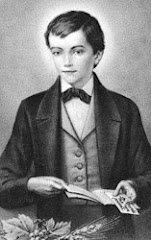RICHMOND, Va. - On Sunday afternoons, when the local Roman Catholic church holds Mass for Spanish-speaking Catholics, Edgar Chilín is playing soccer in a league with hundreds of Hispanic players.
As a child in Guatemala, Mr. Chilín attended Mass every Sunday. But after immigrating to the United States 25 years ago, he and his family lost the churchgoing habit. "We pray to God when we feel the need to," he said, "but when we come here to America we don't feel the need."
A wave of research shows that increasing percentages of Hispanics are abandoning church, suggesting to researchers that along with assimilation comes a measure of secularization.
The Roman Catholic Church, the religious home for most Hispanics, is experiencing the greatest exodus. While many former Catholics join evangelical or Pentecostal churches, the recent research shows that many of them leave church altogether.
"Migrating to the U.S. means you have the freedom to create your own identity," said Keo Cavalcanti, a sociologist at James Madison University in Harrisonburg, Va., and a co-author of a recent study that found a trend toward secularization among Hispanics in Richmond. "When people get here they realize that maintaining that pro forma display of religiosity is not essential to doing well."
A separate study of 4,000 Hispanics to be released this month by the Pew Forum on Religion and Public Life and the Pew Hispanic Center found that 8 percent of them said they had "no religion" - similar to the 11 percent in the general public. Of the Hispanics who claimed no religion, two-thirds said they had once been religious. Thirty-nine percent of the Hispanics who said they had no religion were former Catholics.
Hispanics from Cuba were the most secular national group, at 14 percent, followed by Central Americans at 12 percent, Puerto Ricans and Dominicans at 9 percent, and South Americans at 8 percent, the Pew poll found. Mexicans in this country were the least likely to say they had no religion, at 7 percent.
A larger survey, called the American Religious Identification Survey, a study of 50,000 adults, including 3,000 Hispanics, found that the percentage of Hispanics who identified themselves as having no religion more than doubled from 1990 to 2001, to 13 percent from 6 percent.
This change is happening even though many Hispanics immigrated from countries steeped in religion, where saints' days and festivals mark the passage of time, and grandmothers round up their progeny each Sunday to go to Mass.
"They come, they adopt the American way, and part of the American way is moving towards no religion," said Ariela Keysar, associate director of the Institute for the Study of Secularism in Society and Culture at Trinity College in Hartford.
[ Actually, the United States of America was founded on Christian principles and therefore, the "true" American way is not "no religion". However, if this lady is talking about how most Americans have given into this world today, then yes, that does describe the average American. However, just because a culture is a certain way, doesn't make it good or right. If I went to an Indian village where the "culture" was to eat humans, then I wouldn't do it because I wanted to adapt to the culture. And actually, it is quite impossible to move to "no religion". Even if you are following this world and think you have no religion, you are still worshiping something---most likely yourself.]
Each year, Diana Lemus - a real estate agent and owner of Happy Mart, a busy Latino market in Richmond - makes New Year's resolutions that include working out more, getting out of debt, being a better mother and attending church once a week.
Ms. Lemus, a first-generation immigrant, said that this year she had kept all of them, except going to church - and spends Sunday mornings at the gym. She thinks her faith is important, but said that perhaps she has grown "too materialistic."
"I need God in my life, but I told the pastor, I get sleepy," she said. "You have to stay in church from 1:30 to 5. I think if services were shorter, more entertaining."
[This woman is probably referring to a Protestant church service (as Catholic Church serves would probably never go more than 2 hours and usually are only about 1 hour.), but nonetheless---how can you say your are too "sleepy" for God? If God meant everything to you, you would do anything, no matter what, to love Him.]
[Ah. So important they go to the gym instead of worshiping God. OK.....?]
This confirms research findings that Hispanics who said they had no religion represent a small subset; many more Hispanics are living rather secular lives but still identify themselves as Catholics or Christians. The phenomenon is similar to that of "cultural Jews," said Roberto Suro, director of the Pew Hispanic Center.
"You can feel very strongly about the Virgin of Guadalupe and believe your children ought to be baptized, and still not participate in the Catholic Church or make it a major factor in your life," Mr. Suro said.
[Really? You mean you can just baptize your children with no intention of raising them in the Faith? Yes, it would be a valid baptism for the child, but the parents who have no intention of raising their children in the Faith (which includes going to weekly Sunday Mass) commit a very serious sin. Mr. Suro, sorry, I'll pray for you---but I hope you find the truth before it's too late.]
Richmond and adjacent Chesterfield County have a rapidly growing and diverse Hispanic population, with immigrants from the Caribbean, Central America, Colombia and Mexico. Some are new arrivals, but many have been in the United States for years and resettled here from Northeastern and Southern states, attracted by the area's jobs, relatively affordable housing and receptive local governments.
The increase in the Hispanic population has meant a proliferation of churches. But even when their own churches are thriving, Hispanic ministers say that most Hispanics they approach are not interested.
"Church is not very popular," said Francisco Hernandez, who is pastor with his wife, Connie, of the Iglesia de Dios Alfa y Omega, a Pentecostal church with 400 members. "The majority don't go, and those who go, go one time."
Asked why, he said that his church's strict rules were a hard sell, adding, "People like a superficial religion."
[That last sentence really hits the nail on the head. People are too lazy to get real about their Faith. Many just seek after "feel good" religions which don't help them, but rather hinders them in their finding God. If one ate sweets all the time because they didn't want to suffer eating "gross" food, then they would become very sick and never grow. Religion is the same. The Truth will set you free--though it may hurt a little.]
This may be true, and a few young Hispanic women said in interviews that they avoided strict evangelical churches because they frowned on women wearing pants or makeup. However, many more Hispanics said they were simply too busy to attend any church. They said Sunday is a work day, or it is their only day off to wash clothes, go to the market, do errands and relax.
[Isn't this a good excuse? No. So you can work hard all the time to provide for your physical needs, but are never able to take time enough to follow God and save your soul? I don't think so. If something is important enough for you, you will always find a way of doing it.]
Before Mirna E. Amaya and her husband bought their restaurant, Palacio Latino, three years ago - and when she lived in Maryland - she went to Mass every Sunday. Now she says she is working too hard to go, even though she says she misses it.
"In El Salvador, people went to the church because there's nothing much else to do," Mrs. Amaya said.
[That is so ridiculous it almost makes me want to laugh and cry at the same time. If that is true, then no wonder "busy" Hispanics don't go to Church--because they never had Faith to begin with.]
[Just would like to remind everyone that Faith is not placed in people but in God. Jesus said out right that there would be weeds in the wheat. That meant there's going to be bad among the good in the Church. That doesn't make your religion false just because it has sinners. No religion is free of sinners.]
But she said the Roman Catholic Church was still her preference. The closest parish, St. Augustine Catholic Church, has bent over backward to minister to Hispanics. It offers Mass in Spanish, classes in English, a medical van, job assistance and an instant community for lonely new arrivals. The Sunday Spanish Mass is standing room only.
And yet, the pastor, Msgr. Michael Schmied, also the vicar for the diocese's Hispanic Apostolate, said: "My fear is the strength of secularization, the influence of Americanized pop culture. Is the spiritual tradition of the church, Catholic and Protestant, strong enough to withstand the secularizing cultural influences?"
[Only if we stand up and fight!]
Jesus Cerritos, a 37-year-old construction worker who immigrated from Mexico 18 years ago, said he spent his weekends running errands, going to Wal-Mart and watching television. His children, ages 11 and 9, tell him that church is boring and that they have no desire to go, but Mr. Cerritos has mixed feelings.
"Here, the people get more materialistic," Mr. Cerritos said. "The culture here is really barren. There's no traditions."
If he were still living in his hometown of Guanajuato, he said, "I would probably go to church."
[Do you let your kids skip school because it's "boring"? Only if your stupid. Now school is where you can grow academically, however, in nurturing our Faith we can become close to the God who saved us and brings us eternal life which is infinitely more important. You can't expect people to come to Church who have no Faith. If they have no Faith the only reason they would go is for a personal reason (e.g. entertainment or "feeling good") "And after that John was delivered up, Jesus came into Galilee, preaching the gospel of the kingdom of God, And saying: The time is accomplished, and the kingdom of God is at hand: repent, and believe the gospel." (Mark 1:14-15)










No comments:
Post a Comment